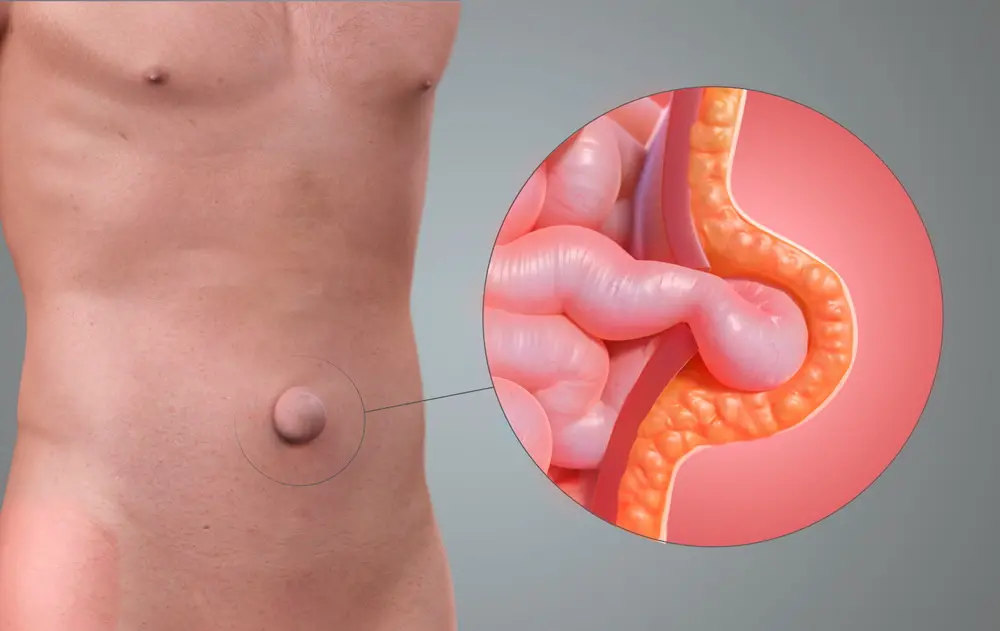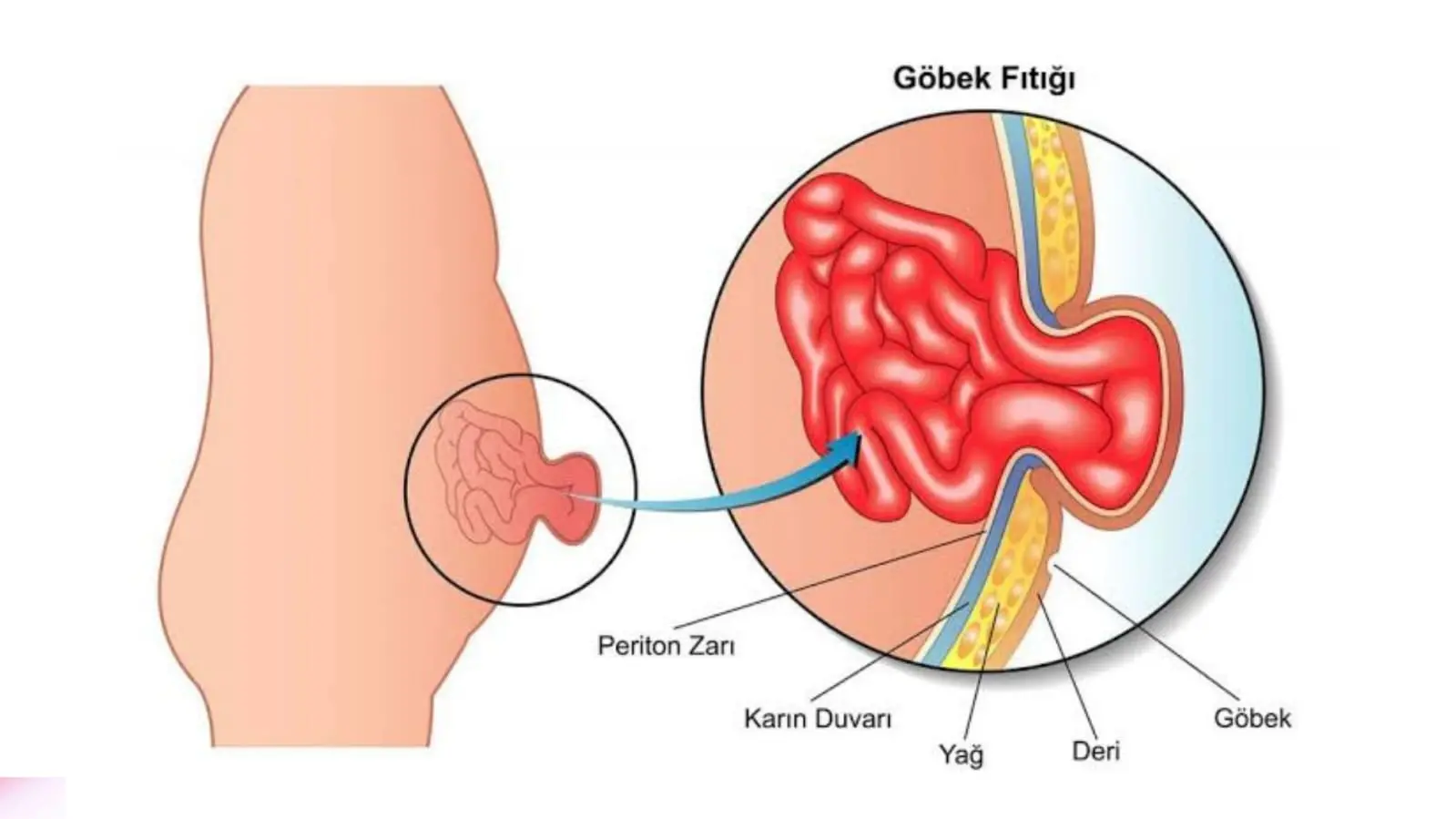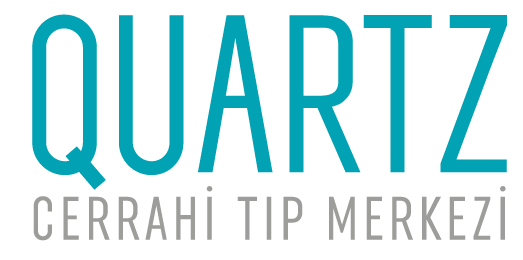
Contents
- What Is an Umbilical Hernia?
- What Causes an Umbilical Hernia?
- Symptoms of an Umbilical Hernia
- Does an Umbilical Hernia Cause Pain?
- Signs of a Strangulated Hernia
- Can an Umbilical Hernia Heal on Its Own?
- When Is Umbilical Hernia Surgery Necessary?
- Types of Umbilical Hernia Surgery
- Recovery After Umbilical Hernia Surgery
- Umbilical Hernia Surgery Cost in Turkey
- Frequently Asked Questions (FAQ)

Umbilical hernia is a type of abdominal hernia that occurs when internal organs or tissues protrude through a weak spot in the abdominal wall, typically around the navel (belly button). It can affect both children and adults and may cause discomfort, pain, or even serious complications if left untreated.
In this article, we’ll explore what umbilical hernia is, its symptoms, causes, treatment options, and what to expect after hernia surgery.
What Is an Umbilical Hernia?
An umbilical hernia (medical term: umbilical hernia) happens when a portion of the intestine or fat tissue pushes through a weakness in the abdominal muscles near the navel. It usually appears as a soft bulge that becomes more pronounced when coughing, laughing, or straining.
Some hernias may remain asymptomatic, but early diagnosis and timely treatment are crucial to prevent complications.
What Causes an Umbilical Hernia?
Several factors contribute to the formation of an umbilical hernia, including:
- Obesity (excess abdominal pressure)
- Chronic constipation or straining
- Heavy lifting
- Pregnancy and childbirth
- Previous abdominal surgeries
Congenital weakness in the abdominal wall (especially in infants)
This muscle weakness allows abdominal contents to bulge out, resulting in a visible hernia.

Symptoms of an Umbilical Hernia
Umbilical hernia symptoms can vary depending on the size and whether the hernia is incarcerated (trapped). Common signs include:
- A soft bulge around the navel
- Bulge becomes more prominent when coughing or standing
- Discomfort or pain in the abdominal area
- Tenderness or pressure near the belly button
Does an Umbilical Hernia Cause Pain?
Yes. Pain is more likely if the hernia enlarges or becomes trapped. Severe pain, redness, or sensitivity in the area could indicate complications and require urgent medical attention.
Signs of a Strangulated Hernia
The term “hernia rupture” is commonly used by the public, but medically it refers to a strangulated hernia, a serious condition where the blood flow to the herniated tissue is cut off. Symptoms include:
- Sudden, intense abdominal pain
- Firm, discolored bulge
- Nausea or vomiting
- Inability to pass gas or stool
- Fever
If you experience these symptoms, seek emergency care immediately.
Can an Umbilical Hernia Heal on Its Own?
No. An umbilical hernia does not resolve without treatment. The only permanent and effective solution is surgical repair. In some cases, observation may be acceptable if the hernia is small and painless, but growing or symptomatic hernias must be treated.
When Is Umbilical Hernia Surgery Necessary?
Surgical intervention is recommended if:
- The hernia increases in size
- Pain or discomfort is present
- There is a risk of strangulation
- It affects your appearance or quality of life
Types of Umbilical Hernia Surgery
| Feature | Open Surgery | Laparoscopic Surgery |
|---|---|---|
| Incision size | Larger | Small keyhole incisions |
| Recovery time | 2–3 weeks | 1–2 weeks |
| Post-op pain | Moderate | Less |
| Scarring | Visible | Minima |
| Hospital stay | Usually 1 night | Same-day or 1 night stay |
| Candidate suitability | All patients | Suitable candidates only |
The surgery usually takes 30–60 minutes, and most patients are discharged within 24 hours.
Recovery After Umbilical Hernia Surgery
Postoperative care includes:
- Rest for the first few days
- Avoid lifting heavy objects
- Keep the wound clean and dry
- Avoid movements that increase intra-abdominal pressure
- Most patients return to their normal routine within 1–2 weeks.
Umbilical Hernia Surgery Cost in Turkey
The cost of umbilical hernia treatment depends on:
- Type of surgery (open or laparoscopic)
- Size and location of the hernia
- Patient’s overall health status
For detailed information on pricing and to receive a personalized treatment plan, feel free to contact our clinic and book a free consultation.

Frequently Asked Questions (FAQ)
Does an umbilical hernia hurt?
Yes, especially if it grows or becomes trapped.
Can a hernia heal without surgery?
No. Surgical repair is the only permanent treatment option.
Is hernia surgery risky?
Modern techniques significantly reduce the risk. It is a routine and safe procedure when performed by experienced surgeons.
What is a strangulated hernia?
It’s a trapped hernia that loses blood supply. It’s a medical emergency.
Is umbilical hernia common after pregnancy?
Yes. The abdominal muscles stretch during pregnancy, making hernias more likely postpartum.
![dr.leyla-arvas-800×1000.jpg[1] dr.leyla arvas](https://www.quartz.com.tr/wp-content/uploads/2024/11/dr.leyla-arvas-800x1000.jpg1_.webp)
Author : Op. Dr Leyla ARVAS
Dr Leyla Arvas is an internationally recognised specialist in aesthetic surgery based in Istanbul. Graduated in 1998 from Istanbul University Faculty of Medicine, she has developed her expertise by studying in Taiwan, Japan and Spain during her 20 years of experience.
This article March 2, 2026 was updated on
Editor: admin@quartz.com.tr


